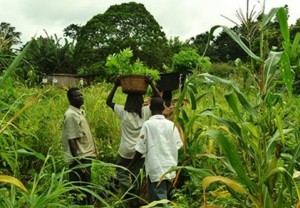Economic transformation in Africa should be spurred by agriculture – ACET
 The African Centre for Economic Transformation (ACET) said Africa’s agricultural sector can drive economic transformation on the continent if the challenges in the sector are properly addressed.
The African Centre for Economic Transformation (ACET) said Africa’s agricultural sector can drive economic transformation on the continent if the challenges in the sector are properly addressed.
Dr. Yaw Ansu, Chief Economist at ACET, speaking on: “The Importance of Agriculture in Economic Transformation,” said if Africa can better impact the lives of its people, it could increase productivity in agriculture.
He said increased productivity in agriculture, could positively impact on the lives of Africans.
He noted that other economies, such as those in East Asia, had transformed their economies mostly based on light manufacturing in a period when the United States and Europe were more receptive to exports.
This, he explained, was because the US and Europe were no longer very receptive to unlimited exports, technology was no longer labour-intensive and the World Trade Organisation reduced the room for promoting exports, thus the need to find leverage.
“We have a growing youth population, and will have more young people than in China by 2050, over half of the world’s still uncultivated, arable land and a mostly tropical weather conducive for farming” he said, adding that a big part of Africa’s industrialisation strategy had to come from agriculture.
Dr Ansu, was giving highlights of a study being conducted by ACET for the 2016 African Transformation Report: ‘Transforming Africa’s Agriculture’ at a workshop organised by ACET and the Institute of Financial and Economic Journalists (IFEJ) for members of IFEJ in Accra.
While agriculture plays a very big role in most African economies, making up about 40 per cent of economies in the 1970s, it now stood at about 20 to 30 per cent.
Most importantly agriculture employed many people in these countries; 45 per cent in Ghana and about 70 per cent in Ethiopia, Tanzania and Uganda.
He said modernising and commercialising agriculture will not only serve as a foreign exchange earner through exports to support other imports such as equipment, but will also serve as a base for other forms of industrialisation such as cotton into textiles, or food processing.
It would also create employment by attracting more young educated people into the agricultural sector.
In order to do this however, there was the need to address challenges including land tenure systems in the country to give access to land for commercial farming.
He said while the customary land tenure system had worked in the past, the world had changed.
He acknowledged that the problem of land tenure was tricky and should be addressed with care.
“How do you ensure that, you reform in a way that does not make people destitute but at the same time give ownership title to the modern farmer for commercial use,” he said.
Other challenges that would have to be dealt with include boosting productivity, mechanisation and access to credit, input and output markets, among others.
The report, he noted, will address these issues in a bid to chart a vision for the future of agriculture in Africa and a blueprint for its implementation.
Ms. Dede Amanor-Wilks, Director of Communications and External Relations at ACET, said the group was committed to working with the media as partners in the transformation agenda, thus the workshop, which was the start of a series of workshops to be held with IFEJ.
She stated that the message that journalists carried to their audience was very important, thus the need for them to be able to probe issues and keep governments accountable.
Mr Lloyd Evans, President of IFEJ bemoaned the polarisation of the media in Ghana along partisan lines and urged the journalists to play the watchdog and agenda-setting roles in order to help the country develop and transform.
He added that the collaboration with ACET will also help to give journalists more sources of information for their work.
Source: GNA
